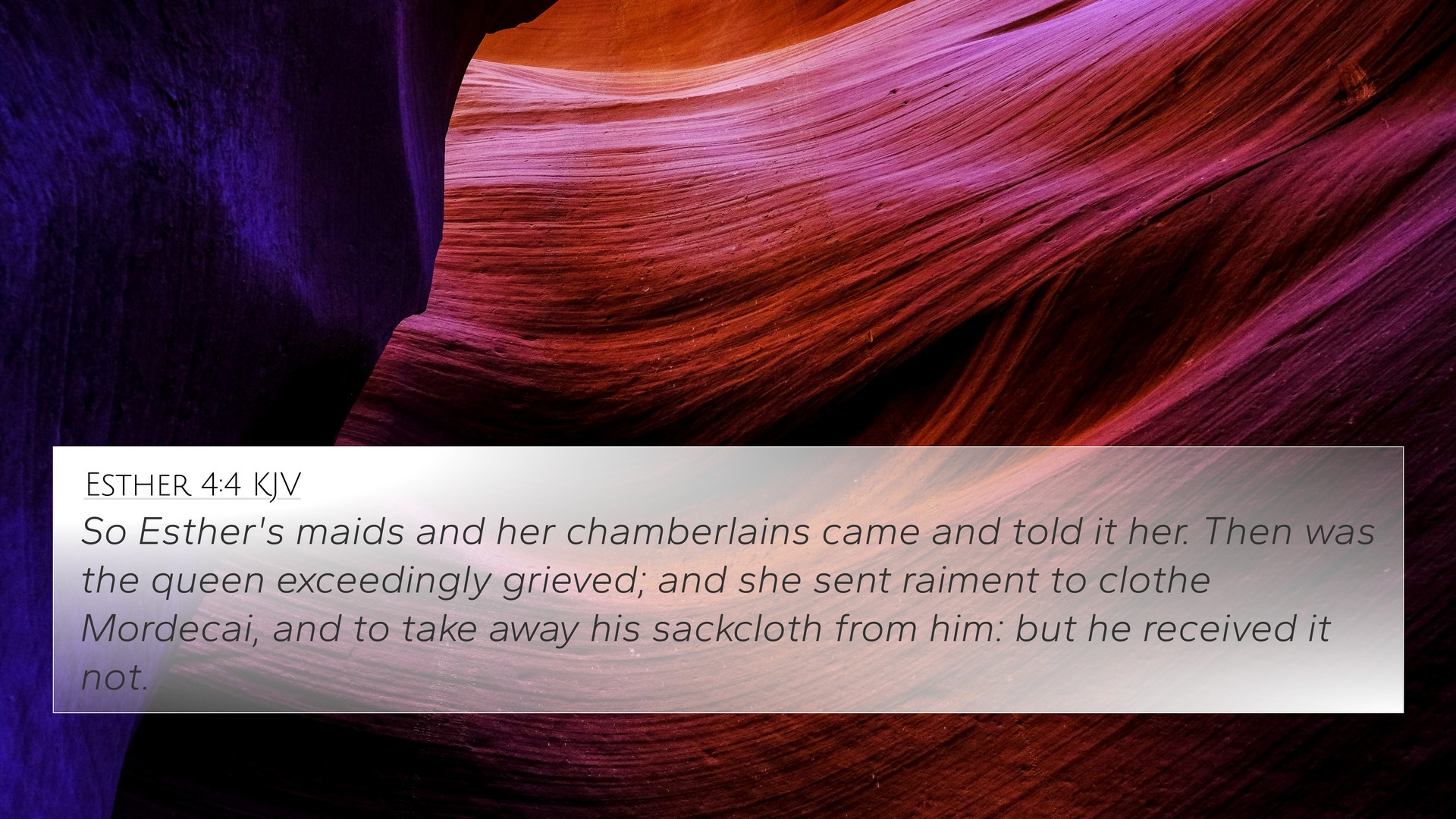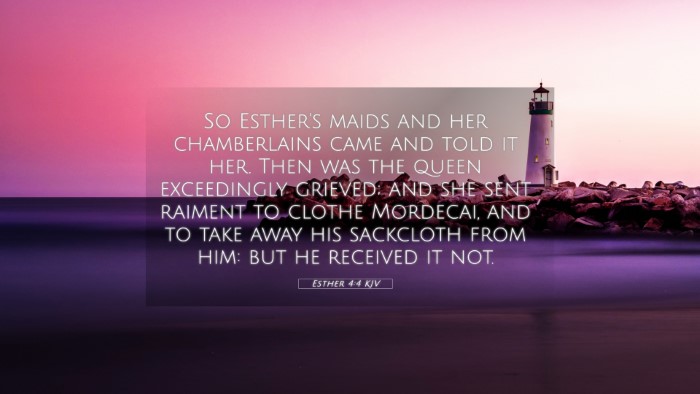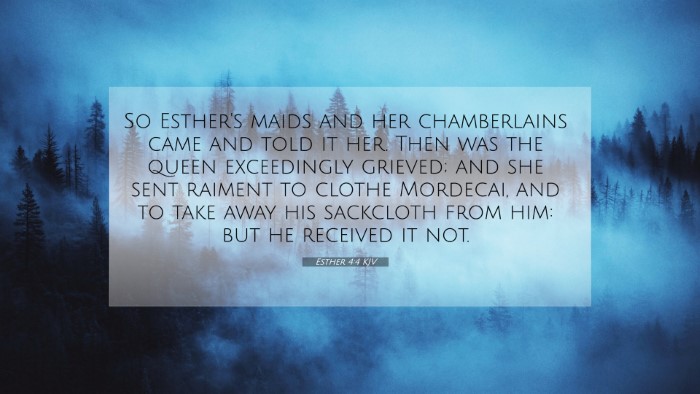Old Testament
Genesis Exodus Leviticus Numbers Deuteronomy Joshua Judges Ruth 1 Samuel 2 Samuel 1 Kings 2 Kings 1 Chronicles 2 Chronicles Ezra Nehemiah Esther Job Psalms Proverbs Ecclesiastes Song of Solomon Isaiah Jeremiah Lamentations Ezekiel Daniel Hosea Joel Amos Obadiah Jonah Micah Nahum Habakkuk Zephaniah Haggai Zechariah MalachiEsther 4:4 Similar Verses
Esther 4:4 Cross References
So Esther's maids and her chamberlains came and told it her. Then was the queen exceedingly grieved; and she sent raiment to clothe Mordecai, and to take away his sackcloth from him: but he received it not.
Uncover the Rich Themes and Topics of This Bible Verse
Listed below are the Bible themes associated with Esther 4:4. We invite you to explore each theme to gain deeper insights into the Scriptures.
Esther 4:4 Cross Reference Verses
This section features a detailed cross-reference designed to enrich your understanding of the Scriptures. Below, you will find carefully selected verses that echo the themes and teachings related to Esther 4:4 KJV. Click on any image to explore detailed analyses of related Bible verses and uncover deeper theological insights.

Psalms 77:2 (KJV) »
In the day of my trouble I sought the Lord: my sore ran in the night, and ceased not: my soul refused to be comforted.

Genesis 37:35 (KJV) »
And all his sons and all his daughters rose up to comfort him; but he refused to be comforted; and he said, For I will go down into the grave unto my son mourning. Thus his father wept for him.
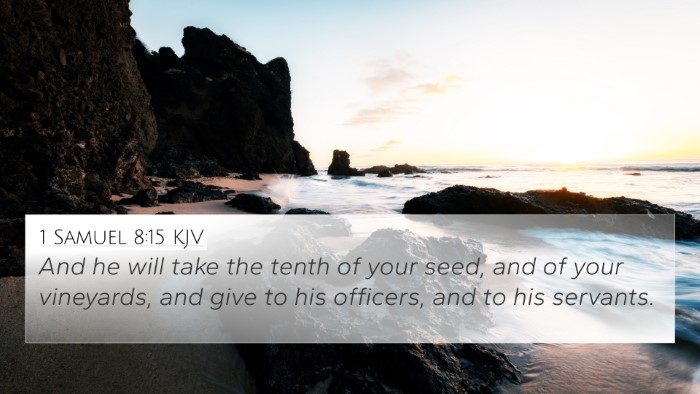
1 Samuel 8:15 (KJV) »
And he will take the tenth of your seed, and of your vineyards, and give to his officers, and to his servants.
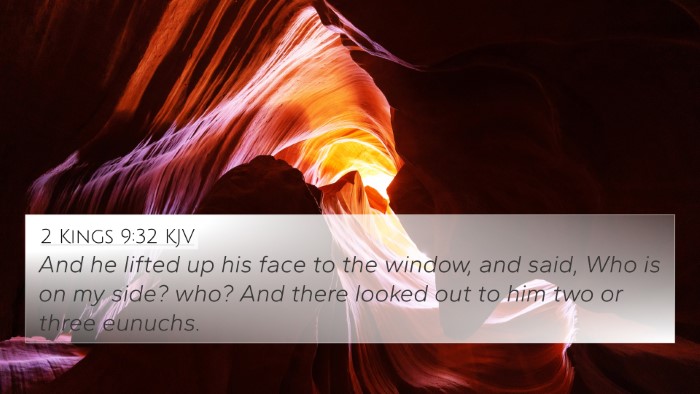
2 Kings 9:32 (KJV) »
And he lifted up his face to the window, and said, Who is on my side? who? And there looked out to him two or three eunuchs.
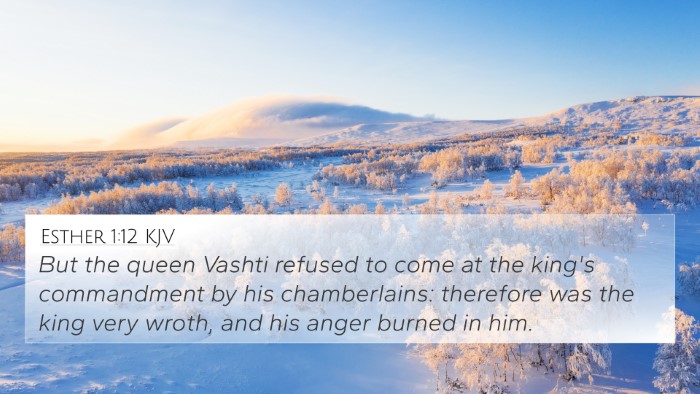
Esther 1:12 (KJV) »
But the queen Vashti refused to come at the king's commandment by his chamberlains: therefore was the king very wroth, and his anger burned in him.
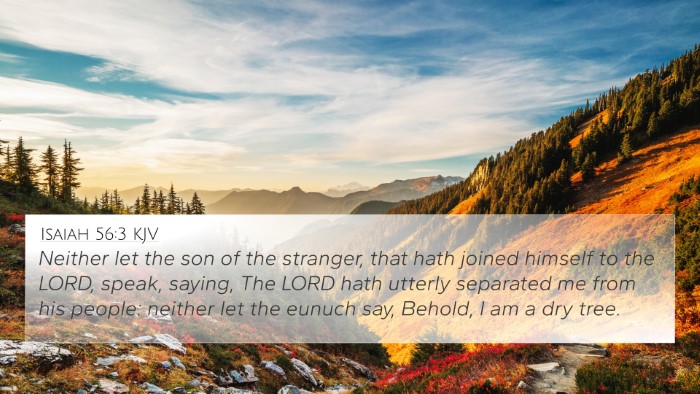
Isaiah 56:3 (KJV) »
Neither let the son of the stranger, that hath joined himself to the LORD, speak, saying, The LORD hath utterly separated me from his people: neither let the eunuch say, Behold, I am a dry tree.
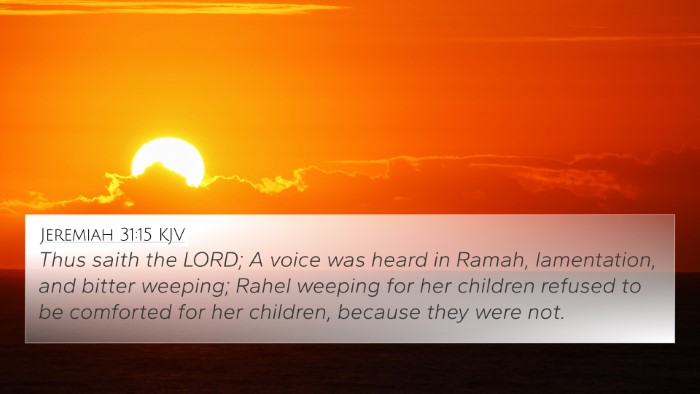
Jeremiah 31:15 (KJV) »
Thus saith the LORD; A voice was heard in Ramah, lamentation, and bitter weeping; Rahel weeping for her children refused to be comforted for her children, because they were not.
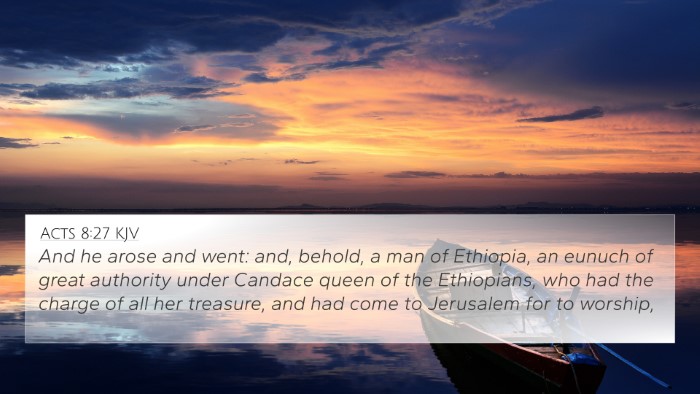
Acts 8:27 (KJV) »
And he arose and went: and, behold, a man of Ethiopia, an eunuch of great authority under Candace queen of the Ethiopians, who had the charge of all her treasure, and had come to Jerusalem for to worship,
Esther 4:4 Verse Analysis and Similar Verses
Bible Verse Meaning: Esther 4:4
Bible Verse: Esther 4:4
Context: This verse occurs during a pivotal moment in the Book of Esther, where Esther learns of the dire situation faced by her people, the Jews, who are threatened with annihilation. She receives this news from Mordecai, who urges her to intercede with the king.
Summary of Esther 4:4
Esther's maidens, upon learning of Mordecai's distress, convey the situation to her. The deep concern displayed by her relatives indicates the severity of the circumstances, and Esther is perplexed by Mordecai's actions, showing the emotional weight of her responsibilities.
Interpretation from Public Domain Commentaries
Matthew Henry's Commentary
Henry emphasizes that Esther's initial reaction is one of confusion and concern. He notes that her comfort is disrupted by the affliction of her people. His commentary highlights the importance of communication within the family of God and the role of servants in God's plan. Esther’s reaction shows a human response to distress, which leads to a significant moment of decision and faith.
Albert Barnes' Notes
Barnes reflects on the depth of Esther's dilemma, as she is caught between her identity as a Jew and her role as queen. He suggests that this verse illustrates the connection between personal and communal responsibilities. Esther’s worry over Mordecai’s actions reflects her sense of duty to her people and the impact of her decisions upon them.
Adam Clarke's Commentary
Clarke points out the emotional dynamics at play, noting that Esther is distressed not only for herself but for her entire nation. He elaborates on the nature of the threats they face and emphasizes that Esther seeks to understand the gravity of the situation. Clarke also discusses the fear of repercussion faced by Esther, indicating a broader theme of courage and obedience to God’s calling, as she ultimately must choose to act.
Thematic Connections in Scripture
Esther 4:4 resonates with various themes prevalent throughout the Bible, particularly concerning courage, intercession, and communal identity. The following cross-references provide deeper insights into these themes:
- Esther 4:14: Highlights the necessity of Esther's intervention and the idea that her being in the palace may be for such a time as this.
- Exodus 32:11-14: Moses’ intercession for Israel showcases the power of one individual standing in the gap.
- Nehemiah 1:4-11: Nehemiah demonstrates a similar response of mourning and seeking God's favor for his people.
- Ephesians 6:18: Encourages believers to pray for others, connecting the virtues of communal intercession found in Esther.
- 1 Peter 5:7: Suggests casting cares upon God, reflecting the communal worries presented in Esther's story.
- Romans 12:15: Connects to the theme of empathy and rejoicing with those who rejoice and weeping with those who weep, paralleling Mordecai’s distress.
- Philippians 4:6-7: Encourages petitioning God in times of worry, similar to Esther’s moment of seeking answers and insights in distress.
- Hebrews 13:3: Calls for unity in the face of suffering and reminds believers to remember those in chains, resonating with Mordecai's condition.
- Matthew 5:10: Blessed are the persecuted for righteousness' sake connects to the plight of Esther's people.
- Isaiah 58:6: Emphasizes the importance of acting on behalf of others and defending the oppressed, reflecting Esther's motivational call to action.
Conclusion
Esther 4:4 reveals profound themes of responsibility, community, and faith. Through commentaries by respected theologians, we unveil an interpretation that highlights the relational dynamics between Esther and Mordecai, their people, and God's purpose for their lives. Exploring related scriptures enriches the narrative, demonstrating the collective strength and courage that arise from understanding one's role within God's broader plan.
Exploring Bible Verse Connections
For readers seeking to engage deeply with the biblical text, utilizing tools for cross-referencing can enhance understanding:
- Using a Bible Concordance to find themes and topics across scriptures.
- Utilizing Bible cross-reference guides to make connections between unique passages.
- Implementing cross-reference Bible study methods to delve deeper into biblical narratives.
- Exploring comprehensive Bible cross-reference materials available in study Bibles.
Whether it's understanding Esther's pivotal moment in the context of God's providence or exploring the connections between her narrative and other biblical accounts, the practice of cross-referencing unveils the rich tapestry of scripture, encouraging believers to find their place in God's unfolding story.
